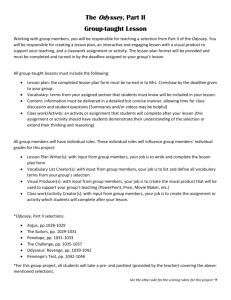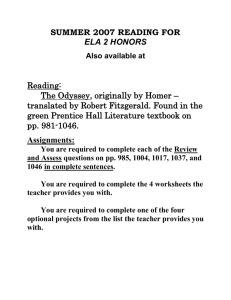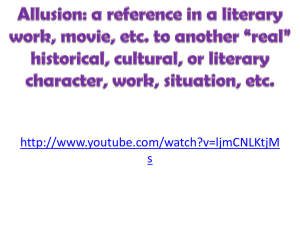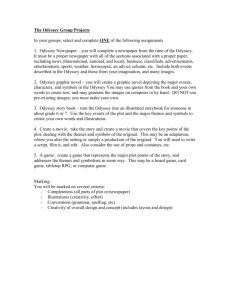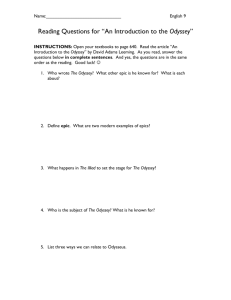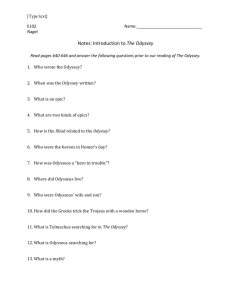VA16
advertisement
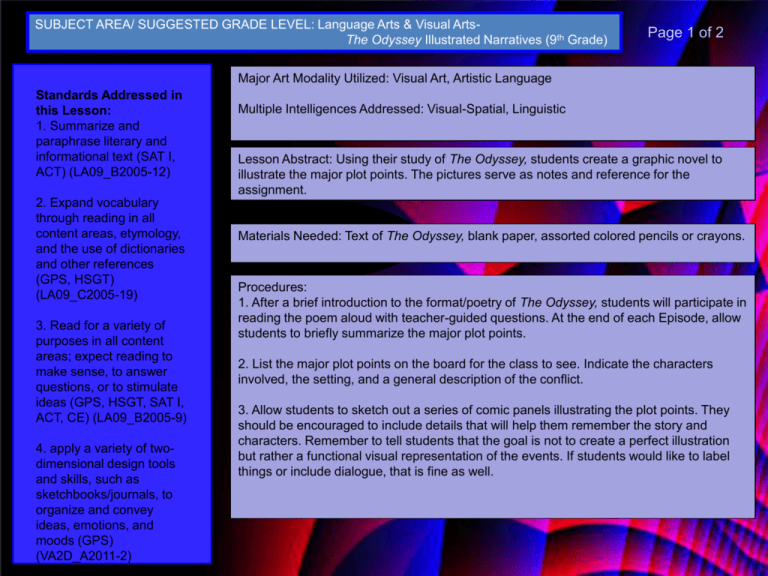
SUBJECT AREA/ SUGGESTED GRADE LEVEL: Language Arts & Visual ArtsThe Odyssey Illustrated Narratives (9th Grade) Page 1 of 2 Major Art Modality Utilized: Visual Art, Artistic Language Standards Addressed in this Lesson: 1. Summarize and paraphrase literary and informational text (SAT I, ACT) (LA09_B2005-12) 2. Expand vocabulary through reading in all content areas, etymology, and the use of dictionaries and other references (GPS, HSGT) (LA09_C2005-19) 3. Read for a variety of purposes in all content areas; expect reading to make sense, to answer questions, or to stimulate ideas (GPS, HSGT, SAT I, ACT, CE) (LA09_B2005-9) 4. apply a variety of twodimensional design tools and skills, such as sketchbooks/journals, to organize and convey ideas, emotions, and moods (GPS) (VA2D_A2011-2) Multiple Intelligences Addressed: Visual-Spatial, Linguistic Lesson Abstract: Using their study of The Odyssey, students create a graphic novel to illustrate the major plot points. The pictures serve as notes and reference for the assignment. Materials Needed: Text of The Odyssey, blank paper, assorted colored pencils or crayons. Procedures: 1. After a brief introduction to the format/poetry of The Odyssey, students will participate in reading the poem aloud with teacher-guided questions. At the end of each Episode, allow students to briefly summarize the major plot points. 2. List the major plot points on the board for the class to see. Indicate the characters involved, the setting, and a general description of the conflict. 3. Allow students to sketch out a series of comic panels illustrating the plot points. They should be encouraged to include details that will help them remember the story and characters. Remember to tell students that the goal is not to create a perfect illustration but rather a functional visual representation of the events. If students would like to label things or include dialogue, that is fine as well. SUBJECT AREA/ SUGGESTED GRADE LEVEL: Language Arts & Visual ArtsThe Odyssey Illustrated Narratives (9th Grade) Area for Teacher Notes: Page 2 of 2 Procedures: (continued) 4. As students are reading, encourage them to list words they don’t know or questions they have about the reading on the backside of the comic panels. The comic books become a reference for discussion and a storage place for notes. 5. Once the class has completed their reading of The Odyssey, students can bind their pages together in order, creating a full comic book of the story. They can use the comic for reference in crafting essay responses or completing quiz/test assignments. 6. The illustrated narrative books can be expanded to include student-written/ illustrated chapters of the story (ex: a “lost” adventure of Odysseus that is an original student creation) to allow for creative writing expression within this unit. Assessment: Students will have achieved the learning objective if they can recall the plot line of The Odyssey and create thoughtful responses to teacher-posed questions. Resources/ Links: Chopstick Book Binding: http://www.instructables.com/id/Chopsticksitck-binding/ Teacher-Guided Questions: http://library.thinkquest.org/19300/data/odyssey.htm
